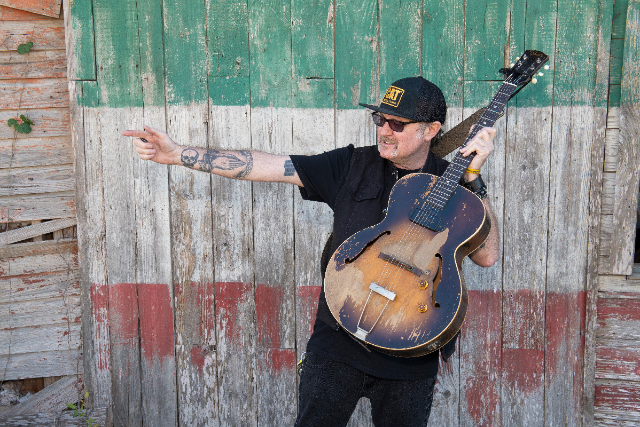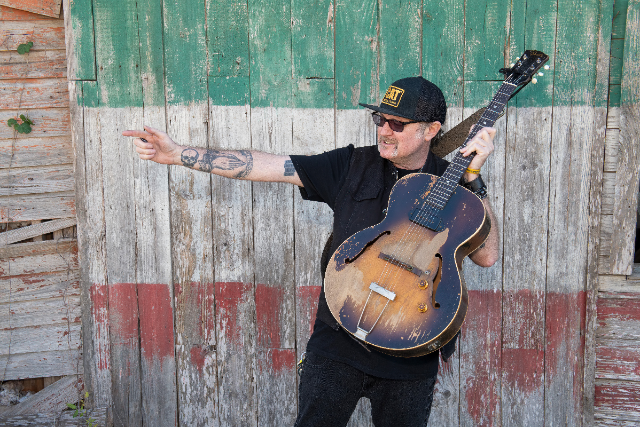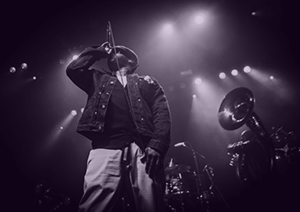
Thursday, April 18th
7p doors / 8p show
All Ages
$15
+$3 at the door if under 21
Scott H. Biram, a proud Texan raised on the outskirts of Austin, is a maverick in the tradition of Doug Sahm, Roky Erickson (13th Floor Elevators) and Gibby Haines (Butthole Surfers). Shortly after releasing his third record (2003’s Lo-Fi Mojo), the 28-year-old’s life was nearly cut short after a near-fatal head-on collision with a big rig semi. He was still bedridden when he made his Rehabilitation Blues EP, the predecessor to his 2005 debut for Bloodshot Records, The Dirty Old One Man Band.

maverick in the tradition of Doug Sahm, Roky Erickson (13th Floor
Elevators) and Gibby Haines (Butthole Surfers). Shortly after
releasing his third record (2003’s Lo-Fi Mojo), the 28-year-old’s life
was nearly cut short after a near-fatal head-on collision with a big
rig semi. He was still bedridden when he made his Rehabilitation
Blues EP, the predecessor to his 2005 debut for Bloodshot Records,
The Dirty Old One Man Band.
Flash forward to 2022. After almost thirty years of tirelessly writing,
recording and touring the front and backroads of America as a solo
bluesman, collecting a wide array of critical accolades, Biram found
himself suddenly stopped cold by the pandemic. Once again,
unwilling to allow outsized forces slow him down, he took
advantage of the shutdown to write, record and produce nine new
songs and two traditional covers for his new album, The One & Only
Scott H. Biram, his 13th overall and 9th for Bloodshot Records.
“I’m constantly trying to go back to the junky, lo-fi sounds of my
early records,” says Biram. “But it’s harder to do now. The more you
learn about production, the harder it is to convey that genuine
unproduced feeling. I have to compromise between overproduced
and lo-fi, so it sounds pro, but still keeps that grittiness.”
“I tend to be all over the place. My brain’s restless. If something
interests me, I’ll write a song about it. I have a kinda rootsy, blue
collar approach with blues, country and folk, but I always throw in
some of my heavier influences from metal and hard rock. I consider
myself a singer and guitarist, above everything else.”
The music on The One and Only Scott H. Biram has the down home,
in-your-face feel that Biram is noted for. “No Man’s Land” opens
with a blues turnaround played on a twanging electric guitar,
backed by a stomping bass and drum backbeat. Biram growls out a
lyric, describing the hazards of growing up poor in a small Texas
town, breathing the fumes from oil wells and brush fires. “I was
remembering a bumper sticker I saw as a kid that said, ‘Oil Field
Trash and Proud of It!’”
“My music has a lot of aggression to it. I express myself without
holding back. If you mixed Muddy Waters, Bill Monroe, Jerry Reed,
and Black Flag, you'd have a good idea of my sound. It's punk, blues,
country, metal, bluegrass and dirty.”
“Inside a Bar” captures the feel of an empty saloon on a slow
Monday night. It’s a straight-forward country blues, with an
understated vocal, intensified by an impressive solo, that mimics the
tones of a pedal steel guitar. “I was going for the sound of loneliness
and alcoholism colliding.”
Other notable tracks include “Sinner’s Dinner,” a rootsy rock tune
that gives us Biram’s take on the riot of January 6; “Dig a Hole/Big
Liar,” a Chicago blues track with a shredding electric guitar solo that
zooms from speaker to speaker; a down and dirty southern gospel
style take on Leadbelly’s “Easy Rider,” with a funky rhythm and
background whoops and hollers that suggest the reactions of a
packed Baptist tent revival, and an acoustic take on “Death Has No
Mercy,” the blues standard made popular by the Rev. Gary Davis. ;
The most unexpected sound is “InterTransmissions,” a short jarring
burst of noise, feedback and sound effects. “I loved the Butthole
Surfers and a lot of psychedelic music when I was comin’ up,” Biram
says. “I wanted to lean into that and add some color to the album. I
don’t think I’ll ever actually do it on stage, unless I’m just pushing a
button on a sampler. Excessive loops and samples are not really my
go-to style.”
The songs on the album deal with mortality, romance, religion,
drinking and memories of the past, but it’s difficult to identify an
overarching theme. “I studied art in college, so I think of my albums
as collages. I grew up playing in punk, metal, blues, country and
bluegrass bands, so I throw in a bunch of stuff to see what resonates.
I’ll follow a heavy blues tune with a tender love song, just the way
life is, no one theme. I’m not tryna write a rock opera. Most of the
time, I’m just getting’ shit off my chest.”
Biram’s albums and EPs are a separate entity from the sound he gets
on stage. “I have a wall of speakers behind me, a big subwoofer, old
beat up hollow-body guitars, harmonicas, and an amplified stomp
board to provide a heavy back beat. I sing in several different kinds
of voices and my solid sound really fills the room. I don’t use loops
but, in the studio, I sometimes overdub bass, guitar, drums,
tambourine and percussion. Other times, I dumb it down and just do
what I do on stage.”
Biram grew up in San Marcos, Texas. “My dad played sax a little bit
around the house. My uncles played guitar together in a band. There
were always guitars and pianos around. I messed around with ‘em,
but didn’t get serious about playing and songwriting until high
school. I sang and wrote lyrics in a punk-metal band. We played in
local bars for free beer, and any attention we could get from the
local chicks. That was cool enough for us back then.
“My dad turned me on to Doc Watson and Leadbelly early on. I
inherited my great-grandfather’s banjo when I was 19, and I started
doing solo acoustic shows on the side. All that while I was still
rockin’ out in the punk band. Those acoustic shows morphed into a
bluegrass band, but I still did solo stuff on the side, stomping my foot
on the floor and developing a more aggressive guitar approach.
Sometime around 2000, I realized I could consolidate the folk roots
with my heavier stuff and offer something that was truly my own.
The Scott H. Biram One Man Band was born.”
“I never liked being called a singer/songwriter,” says Biram, “but
those are some of my best qualities. I don’t want people to think I’m
a 'fool on a stool,’ which is what I imagine comes into people’s heads
when they hear ‘singer/songwriter.’ I try to steer clear of that, when
I can.”
With The One & Only Scott H. Biram, the singer once again proves
himself to be an unstoppable force, refusing to bow in the face of
outside challenges and demonstrating a unique ability to live up to
the traditions of rough-hewn, individualistic Texas-born music. He
looks forward to returning to tour the highways and byways of
America throughout 2024.

Four years since their debut release, Adrian + Meredith take their fearless, blistering, and Balkan-tinged Americana to new heights on their sophomore record, Bad for Business. Recorded in the living room of their midcentury East Nashville house with friends like Paul Niehaus (Justin Townes Earle, Colexico), saxophonist Ken Francis Wenzel (Carlos Santana, Bobby Parker), and banjo player Fats Kaplan (Jack White), Bad For Business is a raucous, rebellious and home-spun variety show. The record’s intimate connection with the recording space and personnel creates the right conditions for Adrian + Meredith to soar sonically and lyrically, as they consider disillusioning times for the country—and the world.
Off the top, Bad for Business highlights the elements that make Adrian + Meredith’s music truly theirs—and then pushes those talents further. Adrian Krygowski’s gritty vocals, Meredith’s Krygowski’s fiery fiddling, and the band’s distinctive, foot-stomping bounce and sense of eclecticism—all of it has ferocious intentionality. And, from there, the pair get innovative. They use Meredith’s foot percussion on the introduction to “Kids These Days,” they add not one horn but a whole Balkan brass section on “Too Far,” and they give “California,” with its surf-a-billy guitar flourishes, an unexpected indie rock lean. Clearly, Bad for Business goes big, highlighting Adrian + Meredith’s confidence in their vision, as well as the influence of their musical mentors, particularly The Legendary Shackshakers’ JD Wilkes and Mark Robinson, the latter of whom produced and mixed the album.
The lyrical content of Bad for Business is bold too —particularly in its candid exploration of current political issues that have left many artists tight-lipped. “Even” offers unforgiving commentary on the Trump-era political divide and the obsession with getting “even,” which Adrian puts to rest on “Chalk,” just a few tracks later: “The rain falls equally on everyone,” he sings. Similarly, the klezmer-inspired track, “Kids These Days,” dives into the impact of gun violence in American schools, “California” balks at climate change deniers, and even “Valley View,” a lilting folk tune written from the perspective of an immigrant at Ellis Island, asks “Did we forget who we are?” in the face of current anti-immigration attitudes. That said, the vaudevillian-inspired pair go big with quirky lightheartedness, too. Songs like “Too Far,” highlight their sense of humor as they describe a Thanksgiving dinner political discussion gone bad, and a rousing rendition of the 1963 polka-pop hit, “Who Stole the Keishka,” and upbeat tunes like “Hungover Eyes,” balance Bad for Business’s heavier ruminations with rip-roaring fun.
In the end, Bad For Business is the sound of Adrian + Meredith’s front door, left wide open. The listener is drawn inside by the couple’s warmth, intensity and frankness—and in the end, left with a sense of easy joy and friendship they’d all but forgot.

